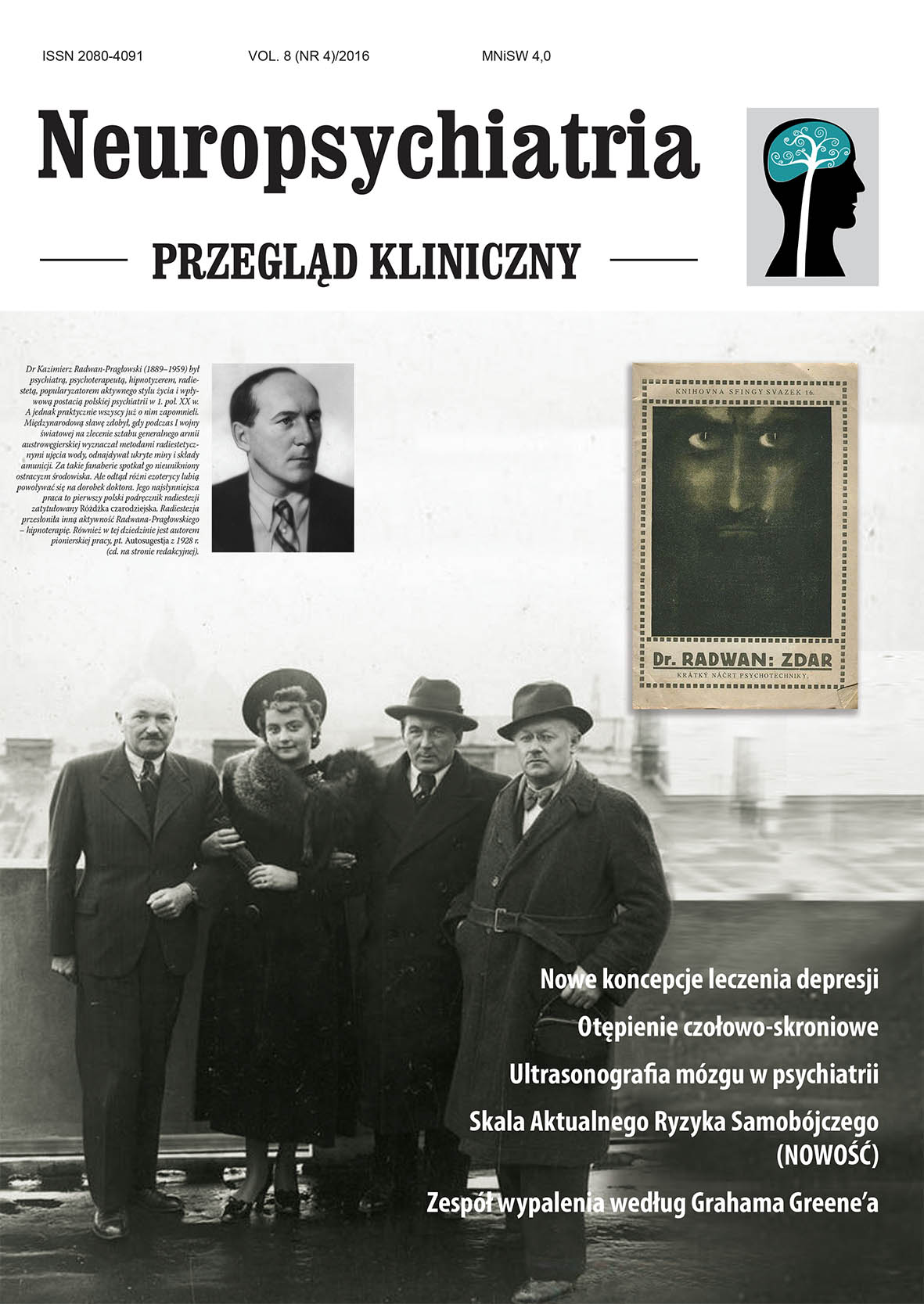Nowe koncepcje leczenia przeciwdepresyjnego Artykuł przeglądowy
##plugins.themes.bootstrap3.article.main##
Abstrakt
Oferowane współcześnie leczenie zaburzeń depresyjnych nie jest skuteczne w stopniu wystarczającym. Dokonano analizy trudności metodologicznych i merytorycznych w osiągnięciu wyższej efektywności leczenia. Artykuł przedstawia nowe leki, nowe metody i nową organizację leczenia zaburzeń depresyjnych. Główny postęp powinien objąć intensywną informatyzację i wykorzystanie obiektywnych algorytmów diagnostycznych, takich jak badania czynnościowe przy wykorzystaniu fMRI. Wobec narastającego stresu cywilizacyjnego i epidemii zaburzeń depresyjnych tylko całościowy program terapii może sprostać tym wyzwaniom.
##plugins.themes.bootstrap3.article.details##

Utwór dostępny jest na licencji Creative Commons Uznanie autorstwa – Użycie niekomercyjne – Bez utworów zależnych 4.0 Międzynarodowe.
Copyright: © Medical Education sp. z o.o. License allowing third parties to copy and redistribute the material in any medium or format and to remix, transform, and build upon the material, provided the original work is properly cited and states its license.
Address reprint requests to: Medical Education, Marcin Kuźma (marcin.kuzma@mededu.pl)
Bibliografia
2. Trivedi MH, Rush AJ, Wisniewski SR. Evaluation of outcomes with citalopram for depression using measurement-based care in STAR*D: Implications for clinical practice. Am J Psychiatry 2006; 163: 1-13.
3. Andrade L, Caraveo A. Epidemiology of major depressive episodes: Results from the International Consortium of Psychiatric Epidemiology (ICPE) Surveys. Int J Methods Psychiatr Res 2003; 12(1): 3-21.
4. Kessler RC, Berglund P, Demler O. The epidemiology of major depressive disorder: Results from the National Comorbidity Survey Replication (NCS-R). JAMA 2003; 289(203): 3095-3105.
5. WHO.
6. Łoza B, Polikowska M. Zespół cywilizacyjny. Nowe rozpoznanie i nowe metody oddziaływań terapeutycznych. Neuropsychiatria. Przegląd Kliniczny 2015; 7(3): 114-124.
7. Łoza B, Polikowska M. Chmura internetowa w psychiatrii. Neuropsychiatria. Przegląd Kliniczny 2016; 9(2): 41-46.
8. Chorążka K, Miłkowska P, Polikowska M, Łoza B. Zaburzenia psychiczne w obrazie funkcjonalnego rezonansu magnetycznego. Neuropsychiatria. Przegląd Kliniczny 2014; 6: 28-33.
9. Polikowska M, Łoza B, Chorążka K, Werbińska-Sienkiewicz B. Obraz kliniczny i farmakoterapia depresji – przegląd dla psychiatrów i lekarzy rodzinnych. Neuropsychiatria. Przegląd Kliniczny 2014; 6: 34-41.
10. Łoza B. Lek przeciwpadaczkowy czy neuroleptyk w stabilizacji nastroju? Ocena przy użyciu funkcjonalnego rezonansu magnetycznego (fMRI). Psychiatria Polska 2010; XLIV, 3(supl.): 159-160.
11. Łoza B, Królicki L, Papierski K et al. Analiza psychofizjologiczna terapii zaburzeń afektywnych ocenianej za pomocą czynnościowego rezonansu magnetycznego (fMRI), spektroskopii (1H-MRS) oraz wolumetrii ośrodkowego układu nerwowego: opis trzech przypadków. Psychiatria Polska 2005; XXXIX: 1231-1236.
12. Davidson RJ, Irwin W, Anderle MJ, Kalin NH. The Neural Substrates of Affective Processing in Depressed Patients Treated With Venlafaxine. Am J Psychiatry 2003; 160 (1): 64-75.
13. Roffman JL, Tanner AS, Eryilmaz H et al. Dopamine D1 signaling organizes network dynamics underlying working memory. Science Advances 2016; 2(6): e1501672.
14. Wessa M, Lois G. Brain Functional Effects of Psychopharmacological Treatment in Major Depression: A Focus on Neural Circuitry of Affective Processing. Curr Neuropharmacol 2015; 13(4): 466-479.
15. Li Z, Tong L, Guan M et al. Altered Resting-State Amygdala Functional Connectivity after Real-Time fMRI Emotion Self-Regulation Training. Biomed Res Int 2016. https://doi.org/10.1155/2016/2719895.
16. Sanacora G, Smith MA, Pathak S et al. Lanicemine: a low-trapping NMDA channel blocker produces sustained antidepressant efficacy with minimal psychotomimetic adverse effects. Molecular Psychiatry 2014; 19: 978-985.
17. Finzi E, Rosenthal NE. Treatment of depression with onabotulinumtoxinA: a randomized, double-blind, placebo controlled trial. J Psychiatr Res 2014; 52: 1-6.
18. Douglas N, Young A, Roebuck T et al. Prevalence of depression in patients referred with snoring and obstructive sleep apnoea. Intern Med J 2013; 43(6): 630-634.
19. Cuijpers P. Psychotherapies for Adult Depression: Recent Developments. Curr Opin Psychiatry 2015; 28(1): 24-29.
20. Cuijpers P. Are All Psychotherapies Equally Effective in the Treatment of Adult Depression? The lack of statistical power of comparative outcome studies. Evid Based Ment Health 2016; 19(2): 39-42.
21. Olfson M, Blanco C, Marcus SC. Treatment of adult depression in the United States. JAMA Intern Med. Published online August 29, 2016.
22. Kamenov K, Twomey C, Cabello M et al. The efficacy of psychotherapy, pharmacotherapy and their combination on functioning and quality of life in depression: a meta-analysis. Psychol Med 2016: 1-12.

